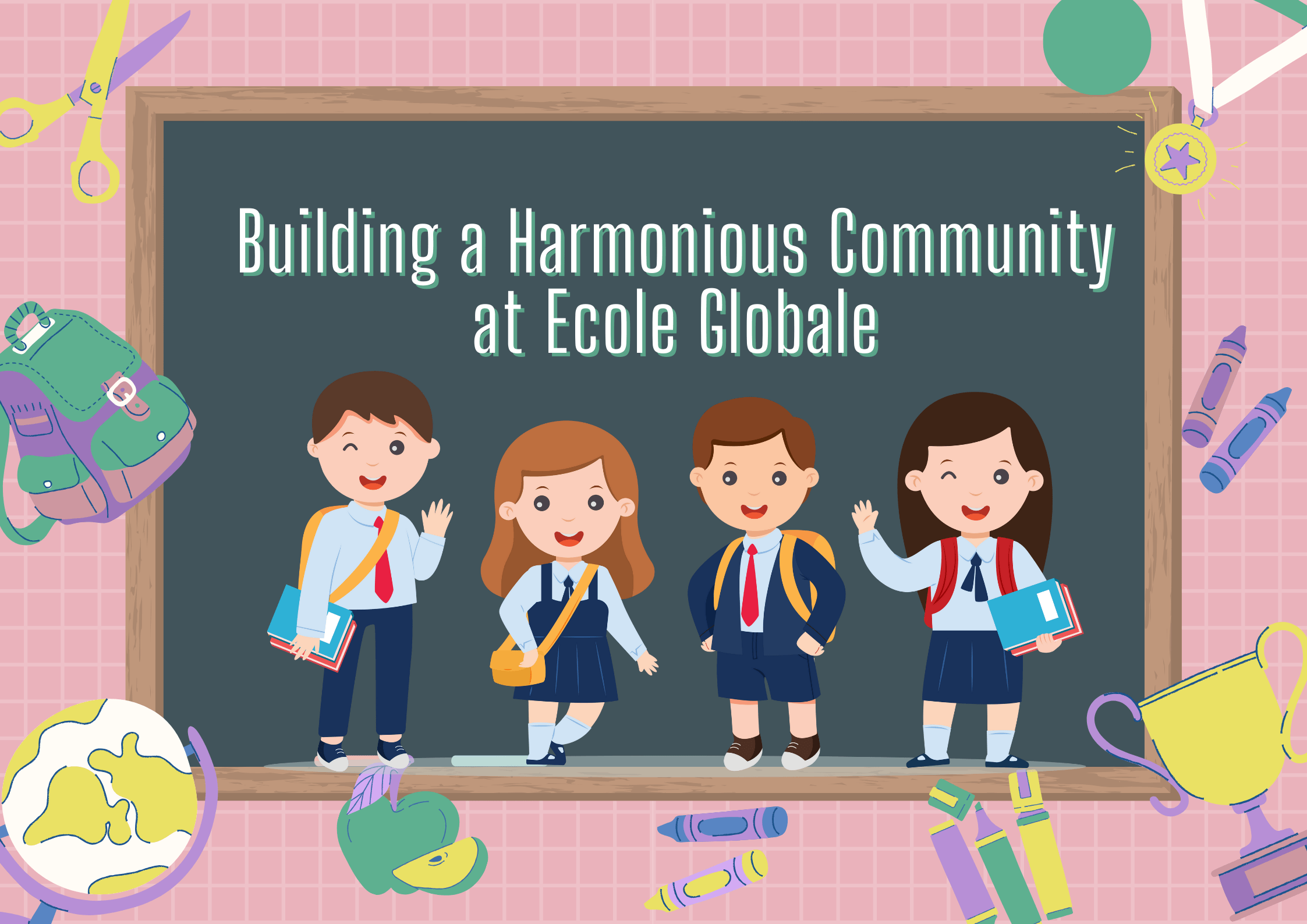In the vibrant area of a school community, conflicts are inevitable. However, how we navigate and resolve these conflicts defines the strength and harmony of the community.
Conflict Resolution Skills At Ecole Globale

Conflict resolution skills are not only essential for fostering a positive environment but also for equipping students with lifelong tools to navigate the complexities of human interaction and building a harmonious Community at Ecole Globale.
Conflict is a natural aspect of human relationships, and schools, being microcosms of society, are no exception. It can arise from differences in opinions, values, or even misunderstandings. The key lies in viewing conflicts not as problems but as opportunities for growth and learning in boarding schools in Dehradun.
Unresolved conflicts can fester, creating an atmosphere of tension and negativity within the school community. It can hinder academic performance, damage relationships, and erode the sense of safety and belonging that is crucial for effective learning in schools in Dehradun.
To build a harmonious community at Ecole, it’s imperative to teach conflict resolution skills. This education goes beyond theoretical knowledge and involves practical, hands-on experiences that empower students with the ability to manage and resolve conflicts constructively.
A foundational skill in conflict resolution is active listening. Students must learn to listen not just to the words spoken but also to the emotions and intentions behind them.
Empathy plays a crucial role here, allowing individuals to understand others’ perspectives and feelings, and fostering a sense of connection and mutual understanding.
Clear and effective communication is the cornerstone of conflict resolution. Students should be taught to express their thoughts and feelings assertively, using “I” statements to convey their perspective without blaming others.
Additionally, they must learn the art of respectful dialogue, creating an environment where opinions can be shared without fear of judgment.
Conflict resolution often involves collaborative problem-solving. Students should be equipped with techniques such as brainstorming and negotiation, encouraging them to find mutually beneficial solutions. This not only resolves the immediate conflict but also builds essential skills for future challenges.
Understanding and managing emotions is crucial in conflict resolution. Schools should incorporate programs that help students develop emotional intelligence, enabling them to navigate conflicts with a sense of self-awareness and empathy toward others.
In many instances, conflicts can be mediated by peers. Schools can establish peer mediation programs where trained students facilitate discussions between conflicting parties. This not only empowers students with leadership skills but also fosters a culture of support and understanding within the school.
Teachers and staff play a pivotal role in modeling and teaching conflict resolution skills. Professional development programs can equip them with the tools to effectively manage conflicts among students and create an environment where open communication and resolution are encouraged.
Preventing conflicts starts with creating a culture of respect and inclusion. Schools should actively promote diversity and inclusion, fostering an atmosphere where differences are celebrated rather than leading to division. When students feel valued and respected, the likelihood of conflicts diminishes.
Rather than punitive measures, schools can adopt restorative justice practices. These approaches focus on repairing harm caused by conflicts, involving all parties in a collective effort to understand the impact and work towards resolution. This not only addresses the immediate issue but also promotes empathy and understanding.
Regular evaluation of conflict resolution programs is essential. Schools should collect feedback from students, teachers, and parents to understand the effectiveness of the initiatives in place. This feedback loop allows for continuous improvement and adaptation to the evolving dynamics within the school community.
Building a Harmonious Community at Ecole Globale: Fostering Unity

Ecole Globale transcends the traditional role of an educational institution. Beyond academics, the school places a profound emphasis on building a harmonious community at Ecole. This commitment to unity and collective growth sets Ecole Globale apart as a beacon of holistic education.
Inclusive Leadership
At the heart of a harmonious community at ecole is its inclusive leadership. The school’s administration believes in fostering an environment where every voice is heard. Headed by visionary leaders, the leadership team actively engages with students, teachers, and parents, creating a sense of shared responsibility and ownership.
Student-Centric Approach
Ecole Globale recognizes that students are not just recipients of knowledge but active participants in the school community.
The curriculum is designed to not only foster academic excellence but also to cultivate a sense of responsibility, empathy, and leadership among students. Student councils and forums provide platforms for them to express their ideas and contribute to decision-making processes.
Diverse and Inclusive Programs
The harmonious community at Ecole thrives on diversity and inclusion. Ecole Globale celebrates the rich tapestry of cultures and backgrounds within its student body.
The school organizes events, cultural festivals, and educational programs that embrace diversity, fostering an atmosphere of mutual respect and understanding among students.
Parental Involvement
A key pillar in building a harmonious community at Ecole is the active involvement of parents. Ecole Globale encourages parents to actively participate in their child’s educational journey.
Regular parent-teacher meetings, workshops, and collaborative projects strengthen the bond between home and school, creating a unified support system for students.
Holistic Development
Beyond academic achievements, Ecole Globale places a strong emphasis on the holistic development of students.
Extracurricular activities, sports, and arts are integrated into the curriculum, providing students with opportunities to explore their passions and talents. This approach nurtures well-rounded individuals who contribute positively to the school community.
Counseling and Support Services
The harmonious community at Ecole recognizes the importance of mental health and well-being. Ecole Globale prioritizes the mental and emotional health of its students through counseling services.
By providing a supportive environment, the school ensures that students feel heard, valued, and equipped to navigate the challenges they may face.
Community Service Initiatives
A sense of community extends beyond the school gates. Ecole Globale instills a spirit of social responsibility through community service initiatives.
Students engage in various projects, from environmental conservation to supporting local charities. These activities not only benefit the broader community but also instill a sense of empathy and compassion in the students.
Communication and Transparency
Open and transparent communication is the bedrock of a harmonious community at Ecole Globale maintains clear communication channels with regular updates, newsletters, and forums.
This transparency fosters trust among stakeholders and ensures that everyone is well informed about the school’s initiatives and developments.
Conflict Resolution and Restorative Practices
In any community, conflicts are inevitable. Ecole Globale recognizes the importance of addressing conflicts promptly and constructively.
The school employs restorative practices that focus on resolving issues through communication, understanding, and reconciliation, creating an environment where conflicts become opportunities for growth and learning.
Continuous Learning and Improvement
Building a harmonious community at Ecole Globale is an ongoing process of learning and improvement. Ecole Globale values feedback from students, parents, and staff. Regular evaluations and assessments help the school identify areas for enhancement, ensuring that the community evolves in tandem with the changing needs of its members.
Conclusion
Ecole Globale’s commitment to building a harmonious community at Ecole Globale is a testament to its dedication to education beyond textbooks.
By fostering inclusivity, celebrating diversity, and prioritizing the well-being of its members, Ecole Globale creates an environment where students not only excel academically but also grow into compassionate, responsible, and community-minded individuals, ready to contribute positively to the world beyond the school gates.
In the intricate dynamics of a school community, conflicts are the threads that, if woven with care, can strengthen rather than unravel the fabric.
Conflict resolution skills are not just tools for the present but invaluable life skills that students carry into their future endeavors.
By actively teaching and practicing these skills, schools can cultivate a harmonious community at Ecole Globale and resilient community where conflicts are not feared but embraced as opportunities for growth and understanding.









